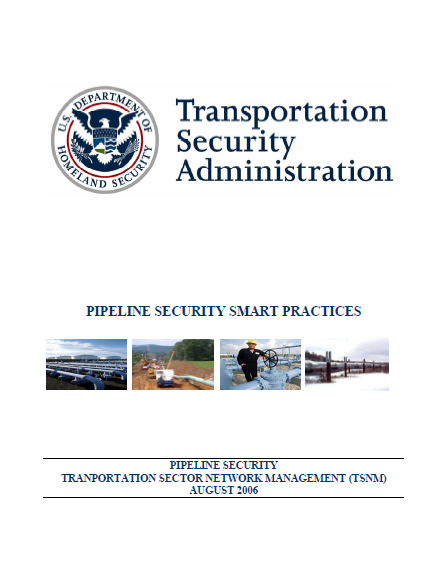 PIPELINE SECURITY TRANPORTATION SECTOR NETWORK MANAGEMENT (TSNM)
PIPELINE SECURITY TRANPORTATION SECTOR NETWORK MANAGEMENT (TSNM)
- 28 pages
- For Official Use Only
- August 2006
U.S. hazardous liquids and natural gas pipelines are critical to the nation’s commerce and economy and, as a consequence, they can be attractive targets for terrorists. Before September 11, 2001, safety concerns took precedence over physical and operational security concerns for a majority of pipeline operators. Security matters were mainly limited to prevention of minor theft and vandalism. The terrorist attacks of 9/11 forced a thorough reconsideration of security, especially with respect to critical infrastructure and key resources. Pipeline operators have responded by seeking effective ways to incorporate security practices and programs into overall business operations.
The Transportation Security Administration (TSA) Pipeline Security Office examines the state of security in the pipeline industry, most notably through its Corporate Security Review (CSR) program. A CSR encompasses an on-site review of a pipeline operator’s security planning and the implementation of those plans. Program goals include developing first-hand knowledge of security measures in place at critical pipeline sites, establishing and maintaining working relationships with key pipeline security personnel, and identifying and sharing smart security practices observed at individual facilities.
The “Pipeline Security Smart Practices” reflect the application of data collected from CSRs conducted since the inception of the program in the fall of 2003. A qualitative and quantitative examination of this data, coupled with literature research of pipeline security measures, identified smart practices operators can institute to promote an effective security program. The practices cover a range of topical security areas, including risk and vulnerability assessments, security planning, threat information, employment screening, facility access controls, physical security, intrusion detection, monitoring systems, SCADA and information technology security, awareness training, incident management planning, drills and exercises, and cooperation with regional and local partners, such as law enforcement and other pipeline operators.
This document is intended to assist the hazardous liquid and natural gas pipeline industries in their security planning and the implementation of security measures to protect their facilities, their assets, their people, and the public. TSA will periodically review these practices to maintain their viability in the face of developments in the threat environment and advances in security technology. The overall objective of this effort is to enhance the security posture of the pipelines transportation mode by identifying and sharing practices that reduce risk and enhance security.
…
OVERVIEW OF PIPELINE SECURITY IN THE UNITED STATES
Hazardous liquid and natural gas pipelines are critical to the health of the U.S. economy. The nation cannot easily heat homes, operate industrial equipment, fuel various air and surface vehicles, or generate adequate levels of electricity without the valuable commodities transported across the country via pipelines. Interruption of pipeline service, whether from a natural disaster or a malicious act, could negatively impact the public health, cause environmental damage, and inflict economic havoc on an individual operator, region, and the nation at large. The high value of the products transported cross-country by hazardous liquid and natural gas pipelines makes them a critical component of the nation’s transportation infrastructure.
The importance of pipelines to the nation’s commerce and economy makes them a potential and favored target for terrorist attacks. Globally, terrorist attacks against pipelines have occurred in Iraq, Nigeria, Columbia, and Russia in recent months. In order to prevent or reduce the impact of such attacks in the U.S., improving and enhancing the security of the nation’s pipeline system is a heightened priority for both government and private industry.
Safety priorities took precedence over physical and operational security concerns for a majority of pipeline operators prior to the terrorist attacks of September 11, 2001. Security matters were mainly limited to prevention of minor theft and vandalism. Since 9/11, pipeline operators have revisited the issue of security and have made the effort to determine how to better incorporate security practices and programs into overall business operations. The pipeline industry’s existing security plans and procedures are based on voluntary guidelines developed and issued by the federal government. The industry largely supports the security guidance and most operators have security plans in place.
Operators are taking a balanced approach to security planning due to resource limitations, such as finances and personnel. Many companies are trying to identify multiple benefits to security planning, such as:
• Providing protection against other non-terrorism threats, such as vandalism, criminal activity, and workplace violence;
• Providing operational benefits and mitigation strategies for outages caused by natural disasters or construction related incidents; and
• Maintaining public confidence in the ability of the operator to provide needed goods to serviced communities.
